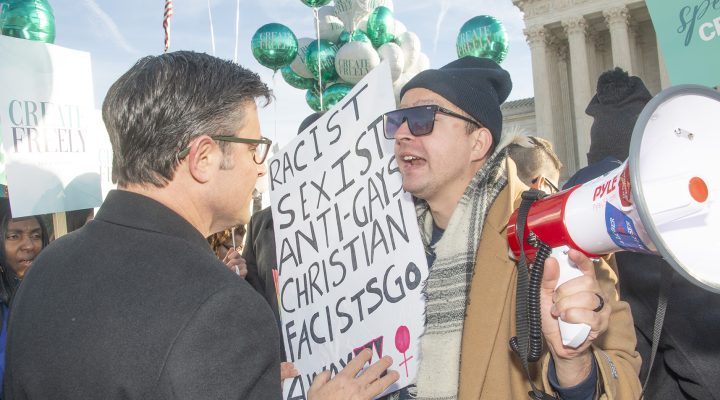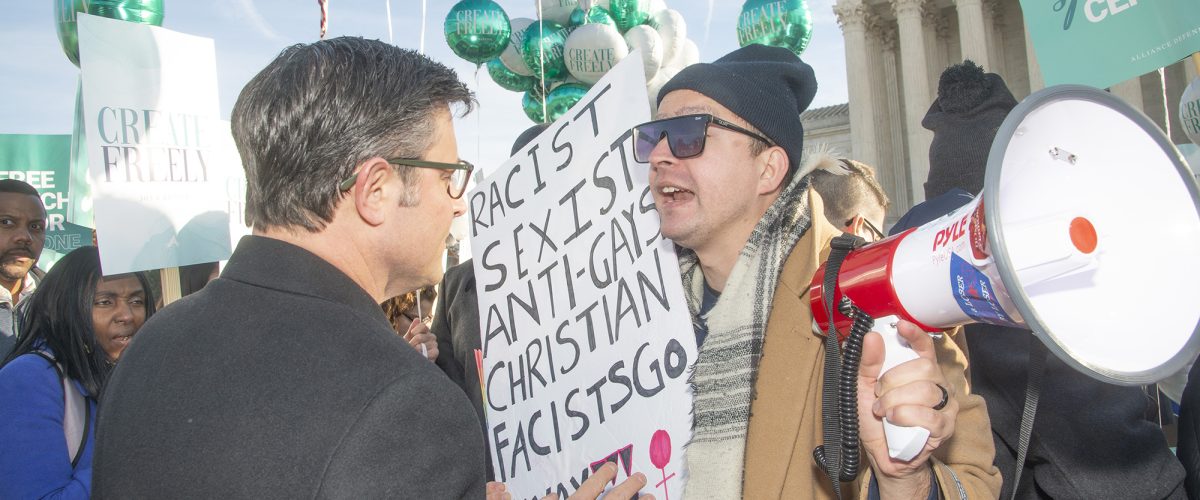While the conservative majority on the U.S. Supreme Court appears ready-made to support a Colorado wedding website designer who doesn’t want to serve same-sex couples, other justices grilled her attorney hard about why she should be allowed to discriminate on such a basic business service.
During two hours of oral arguments in 303 Creative v. Elenis Dec. 5, the plaintiff’s attorney repeatedly said the website designer is engaged in protected free speech through her digital work and should not be subjected to Colorado’s nondiscrimination law.
The case made it to the Supreme Court after two lower courts sided with Colorado to say public businesses cannot discriminate against same-sex couples just as they cannot discriminate against customers based on race or religion. Website designer Lorie Smith wants to offer wedding website services but says the state’s antidiscrimination law prevents her from entering that market since she would be forced to accept work for same-sex weddings, which she believes are sinful.
Not all the justices were buying the argument that designing wedding websites is actually a category of speech.
Not all the justices were buying the argument that designing wedding websites is actually a category of speech, much less a protected category. And justices from both sides raised questions about how refusing to serve same-sex couples is any different than refusing to serve Black customers or disabled customers or anyone else a business owner doesn’t like.
Kristen Waggoner, attorney for plaintiff Lorie Smith struggled to answer those questions, returning every time to her assertion that designing websites amounts to speech.
Justices pressed her to explain how creating a wedding website through what appears to be adaptations of existing templates amounts to speech on the part of the technician.
The speech actually belongs to the couple presenting information about their relationship and their wedding, said Justice Sonya Sotomayor. “You’re not inviting them to the wedding. Lilly and Mary are. So how does it become your message?”
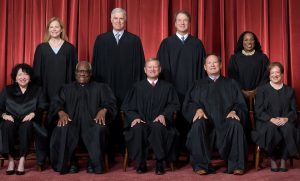
Formal group photograph of the Supreme Court as it was been comprised on June 30, 2022 after Justice Ketanji Brown Jackson joined the court. The Justices are posed in front of red velvet drapes and arranged by seniority, with five seated and four standing. Seated from left are Justices Sonia Sotomayor, Clarence Thomas, Chief Justice John G. Roberts, Jr., and Justices Samuel A. Alito and Elena Kagan. Standing from left are Justices Amy Coney Barrett, Neil M. Gorsuch, Brett M. Kavanaugh, and Ketanji Brown Jackson. (Credit: Fred Schilling, Collection of the Supreme Court of the United States)
Waggoner compared the website designer to the ghost writer of a book or to the writer of a speech someone else gives. Although it may not appear to the public that she is the author, she nonetheless is and should be able to decline certain jobs.
Justices kept pressing Waggoner to explain how refusing to serve a same-sex couple is different than refusing to serve a Black couple or a handicapped couple. What if the business owner has a religious objection to handicapped people marrying?
Waggoner said her client’s concern and this case as a whole is not about any of those other things; it is about a particular view of marriage.
But where should the court draw the line, several justices asked. This appeared to be a concern not only of liberal justices but also of some conservative justices who were sympathetic with the website designer’s concerns related to weddings but indicated no desire to create an open door for all objections labeled as religious in nature.
Justice Amy Coney Barrett pressed Waggoner about other situations the website designer might face, such as a couple getting married after having an adulterous affair that ended their previous marriages. Would the website designer object to that on religious grounds? Waggoner said yes, she would.
Barrett then asked: “So it’s about the message and not about the sexuality of the couple that asked her to express it that matters?”
Waggoner said yes, that’s right.
The court’s newest justice, Ketanji Brown Jackson, engaged vigorously in the oral arguments, as did Barrett, also relatively new to the court. Liberal justices Sotomayor and Elena Kagan also pressed Waggoner for details she often was not able to give.
“And if you believe the wedding to be false, then government would be compelling you to say something that you otherwise wouldn’t say.”
Every time, she returned to the assertion that the website designer is engaged in speech. “You are announcing a wedding,” she said at one point. “And if you believe the wedding to be false, then government would be compelling you to say something that you otherwise wouldn’t say, which makes it content-based.”
Waggoner also explained that Smith has gay clients she gladly serves for other purposes but she does not want to be party to their same-sex weddings.
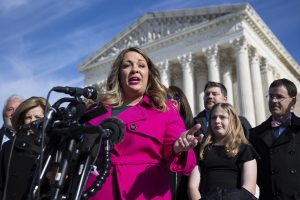
Website designer Lorie Smith, owner of 303 Creative, addresses the media outside the Supreme Court after justices heard oral arguments on 303 Creative LLC v. Elenis Dec. 5, 2022. (Francis Chung/POLITICO via AP Images)
Justice Sotomayor compared that stance to a restaurant that will only serve Black customers out of the back door while welcoming white customers into the dining room through the front door.
Such a business owner says, “I’ll serve Blacks but only on a takeout window, not inside my restaurant because that sends a message that I endorse integration.”
Waggoner replied: “Ms. Smith isn’t looking to send a message through her conduct.”
Sotomayor rejoined: “No, she — what you’re saying is, I want to give gay couples a limited menu, not a full menu.”
Waggoner again returned to speech, saying a restaurant does not engage in speech the way a website designer does.
Then, under questioning from Chief Justice John Roberts, Waggoner said religious belief is not the primary issue: “The religious basis is not determinative here. This court has provided broad protection for religious speech, but it wouldn’t matter. This Compelled Speech Doctrine applies in a host of situations and cases that are not religious.”
The chief justice said he didn’t understand what she meant.
Waggoner added: “She believes she’s being asked to create a message that violates her convictions. Whether those convictions are based on a moral reason or a religious reason, it would be protected.”
Conservative justice Brent Kavanaugh noted he saw “a lot of agreement actually between the parties in this case on basic legal principles. In your reply brief, … you say that hairstylists, landscapers, plumbers, caterers, tailors, jewelers, and restaurants ordinarily wouldn’t have a First Amendment free speech right to decline to serve a same-sex wedding. … But you say artists are different, like publishing houses.”
Kavanaugh continued: “As I read the briefs, the case comes down to a fairly narrow question of, how do you characterize website designers? Are they more like the restaurants and the jewelers and the tailors, or are they more like, you know, the publishing houses and the other free speech analogues that are raised on the other side?
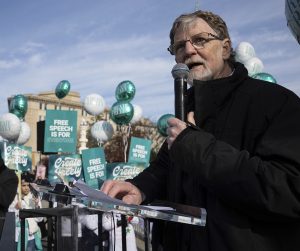
Jack Phillips, owner of Masterpiece Cake Shop in Colorado, speaks during a rally held by supporters of 303 Creative outside the Supreme Court as justices heard oral arguments on 303 Creative LLC v. Elenis Dec. 5, 2022. (Francis Chung/POLITICO via AP Images)
“Those who object to same-sex marriage and creating messages about them, those are the ones that can’t speak.”
Waggoner once again returned to her opening theme: “Because they’re creating speech. In those other examples, speech is not at issue, that is creating speech, announcing a wedding, or announcing anything. And art is different. And so, while there may be agreement on that, there also is a problem with Colorado’s advancing theories that keep narrowing and providing alternatives. But, in the end, one thing is certain: Those who object to same-sex marriage and creating messages about them, those are the ones that can’t speak, but everyone else seems to be able to do so under Colorado’s theory.”
Erie Olson, solicitor general for the Colorado attorney general’s office, represented the state before the court.
He explained the state’s position: “The company can choose to sell websites that only feature biblical quotes describing a marriage as between a man and a woman, just like a Christmas store can choose to sell only Christmas-related items. The company just cannot refuse to serve gay couples, as it seeks to do here, just as the Christmas store cannot announce no Jews allowed.
“Here, the company seeks a pre-enforcement order allowing it to turn away all gay couples, even if, as we’ve discussed, the wedding website they request is identical to one the company would sell to a heterosexual couple. Granting such a license to discriminate would empower all businesses that offer what they believe to be expressive services, from architects to photographers to consultants, to refuse service to customers because of their disability, sexual orientation, religion or race.”
Olson warned: “The Free Speech Clause exemption the company seeks here is sweeping because it would apply not just to sincerely held religious beliefs, like those of the company and its owner, but also to all sorts of racist, sexist and bigoted views. This rule would allow another web design company to say no interracial couples served, an ad agency could refuse women-led businesses, and a tech consulting company could refuse to serve 303 Creative itself because it disagreed with the owner’s religion.”
Pressed by Justice Clarence Thomas to give examples of other court cases that have settled matters of public accommodation laws regulating speech, Olson said there are not many.
“What we don’t see is a history of public accommodation laws carving out speech,” Olson said. “They all are laws of general applicability that apply to all those operating a trade to the public. They don’t say except those engaged in expressive conduct.”
Across the two hours of court discussion, justices repeatedly proposed hypothetical situations and asked both attorneys to say how Smith of the state of Colorado would respond in such situations.
The conservative justices appeared primed to find a way to support the website designer’s appeal for relief while not opening a Pandora’s Box of other adjacent claims. In that, the court faces a similar situation as it did with the Masterpiece Cake Shop case concerning a wedding cake baker. There, the court — although not stacked with conservatives as today — issued a narrow ruling supporting the baker but with little application beyond that particular case.
Advocates for granting discriminatory rights to conservative evangelicals who oppose same-sex marriage are hoping the new case will produce more definitive answers they will like.
The court’s decision most likely will not be given until summer.
Related articles:
Most Americans oppose high court’s decimation of church-state separation, surveys show
Supreme Court to hear case of wedding website designer who won’t serve same-sex couples
Now add a wedding photographer to the list of those successfully objecting to same-sex weddings

